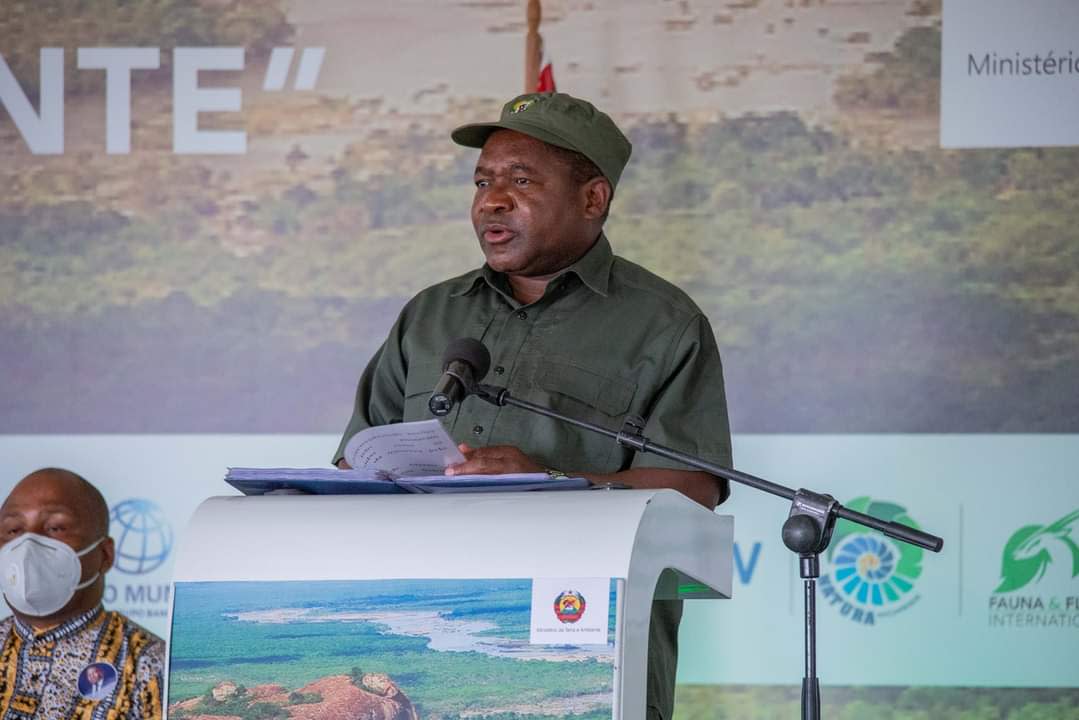Mozambique’s President Nyusi pledges to protect wildlife

Today Mozambique’s President Filipe Nyusi backed The Independent’s Stop the Illegal Wildlife Trade campaign by joining The Giants Club, proving the nation’s lasting commitment to conserving Africa’s most important natural ecosystems and to protecting endangered species.
President Nyusi joined The Giants Club in a signing ceremony in Niassa Special Reserve, held as part of Mozambique’s celebrations of World Ranger Day on 31 July.
After watching a parade by rangers who work on the frontline to protect Mozambique’s wildlife, President Nyusi became the seventh African Head of State to join The Giants Club.
The Giants Club is an international forum of political leaders, businesspeople, financiers, philanthropists, conservationists and scientists, all dedicated to supporting Presidents to achieve their domestic conservation agendas.
President Nyusi joins President Mokgweetsi Masisi of Botswana, President Ali Bongo Ondimba of Gabon, President Uhuru Kenyatta of Kenya, President Paul Kagame of Rwanda, and President Yoweri Museveni of Uganda, who are all joint leaders of The Giants Club. Botswana’s Former President Ian Khama acts as President Emeritus.
The Giants Club is an initiative of the international conservation organisation Space for Giants which, with partner organisations, implements the programmes that The Giant’s Club’s Heads of State choose as their conservation priorities. Space for Giants is headquartered in Kenya and operates in 10 countries across Africa, including Mozambique.
Alongside the Heads of State, The Giant Club’s nearly 40 members include business people from Africa, the US, Europe, the UK, Russia, and the Gulf. Conservation scientists from Space for Giants and other organisations advise the Club.
Together these individuals combine their political muscle, extensive financial resources, pioneering scientific expertise, and global reach and influence to fulfil the Club’s goal to protect Africa’s remaining populations of large animals and their habitats.
Primarily it does this by advising governments as they build their ‘nature-based economies’, linking them to investment in conservation that boosts sustainable businesses and brings jobs as well as protects environments.
In joining The Giant Club President Nyusi is committing to forge new partnerships to protect nature, while driving development in Mozambique. It is a nation rich in natural resources ,and home to more than 4,000 wildlife species - including major mammals like elephants, rhinos, lions, and giraffes - and more than 5,500 species of plants. It has one of Africa’s longest coastlines with more than 1,800km of coral reefs, and 400,000 hectares of mangroves.
Sites of high biodiversity importance include the Great Inselberg Archipelago of Quirimbas, the Gorongosa Mountains, and the Chimanimani Massif. Three global biodiversity hotspots are in Mozambique: the Coastal Forests of Eastern Africa, the Maputaland-Pondoland-Albany, and the Eastern Afromontane.
The Mozambican government, led by President Nyusi, is committed to building a strong national economy and is clear that this is compatible with achieving conservation goals. Preserving landscapes assists national wealth by generating foreign exchange, employment, and tax revenues in a wildlife economy.
Stuart Slabbert, Managing Director of Conservation at Space for Giants, said “Space for Giants and The Giants Club are very proud that President Nyusi is joining to become our latest Head of State member. His commitment to conservation is clear, and partnering with organisations like Space for Giants supports Mozambique to meet challenges such as human-elephant conflict while also bringing in fresh expertise and experience to promote domestic and international investment in responsible conservation and tourism enterprises. Partnerships of the public and private sectors will generate new revenue from wildlife for the benefit of Mozambique’s citizens, and can support efforts to deter the illegal wildlife trade.”
The Giants Club’s Heads of State lead countries that are home to more than half of Africa’s 415,000 remaining elephants. Botswana hosts between herds up to 150,000 strong, mostly centred on the Okavango Delta in its north. Gabon has more than half of the continent’s remaining forest elephants, a distinct species, as well as lowland gorillas.
Read More
Taskforce to tackle piracy, abductions and wildlife trafficking at sea to be launched
Uncovering the web of illegal wildlife traders operating on social media
New podcast explores wildlife crime and asks what can be done to stop it
Uncertainty about UK government conservation budget cuts could deal a ‘tragic blow’ to wildlife
Stop The Illegal Wildlife Trade: L.G.R supports campaign to save endangered animals
West Africa stopping poachers but not flow of money from illegal wildlife trade, study finds

 Yahoo News
Yahoo News 
